
Sunday August 27, 2017
By Kevin Sieff
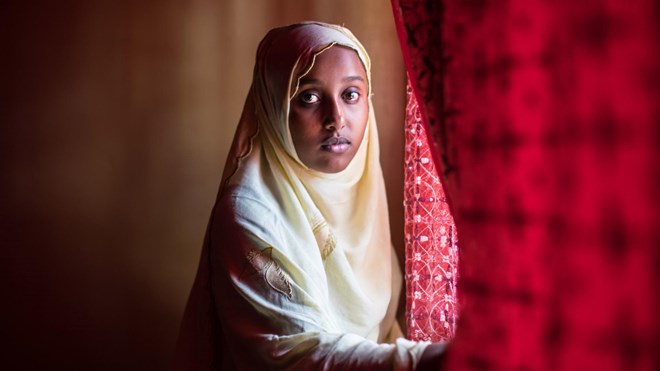
A year ago, Ayan Abdi was one of about 5,000 students who jammed into classrooms across the Dadaab refugee camp for a two-hour exam, the first step in seeking perhaps the most generous scholarship anywhere. (Nichole Sobecki / Washington Post)
It was time to go. Ayan Abdi slipped on a long black headscarf, grabbed her refugee ID and set out for the interview that could save her life.
Since she was 2, Ayan had lived in the world's largest refugee camp, a constellation of tents and huts stretching across the red desert near the Somali border. Now, a few miles from her shack built of sticks and cardboard, three examiners with a Canadian university foundation were sitting at a wooden table, deciding which students were worthy of a way out.
Ayan hurried along the sandy road. Past the piles of burning trash surrounded by giant scavenging birds. Past the girls no older than her, at 20, who balanced firewood on their heads, trailed by barefoot children. Past the group of men who stared at her - a small figure in a flowing black robe and bright red shoes - and hissed in Somali, "Where are you going, girl?"
When Ayan finally found a taxi, it was already full. She squeezed in, her whole body tense, dots of sweat on her forehead.
"I'm in a rush," she told the driver, who didn't ask why but careened a little faster from pothole to pothole.
A year ago, Ayan was one of about 5,000 students who jammed into classrooms across the Dadaab refugee camp for a two-hour exam, the first step in seeking perhaps the most generous scholarship anywhere. The World University Service of Canada, or WUSC, would award 16 of those students not just a college education but a new life, with the Canadian government providing them with citizenship and a chance to sponsor their families.
Now Ayan was one of 29 finalists, heading for the interview that would determine whether she won.
Her other options were being snuffed out. Kenyan authorities were trying to close Dadaab, which for a quarter-century had sheltered the victims of Somalia's endless war and hunger crises. In the United States, which had resettled more than 100,000 Somalis since 2000, President Trump had ordered a temporary ban on accepting refugees. Around the world, countries were shutting their doors to people like Ayan, even as the number of refugees surged past 22 million in 2017, the highest in recorded history.
What was left was the WUSC scholarship - a chance for the bright young refugees of Dadaab to earn their way out.
"It's life or death," said Joseph Mutua, a program officer with the scholarship foundation in Dadaab. "That's how it's seen."
In the taxi, Ayan was drumming her fingers against her knee. A printed verse from the Quran swung from the rearview mirror. On the bumper, a sticker read, "Succeed."
The cab pulled up to a walled compound. "Is this the right place for the scholarship interview?" Ayan asked a security guard.
In her hand, which trembled, was a brown envelope with her documents. The white food-ration card that said "Family size: 1" because Ayan's parents and siblings had returned to Somalia years ago without her. The report cards she had earned since primary school. The recommendations from a Dadaab school where she was now teaching biology.
She carried the envelope to the cinder-block building where the interviews were taking place and sat under a tree, waiting her turn. "I'm getting a headache," she told one of the other applicants.
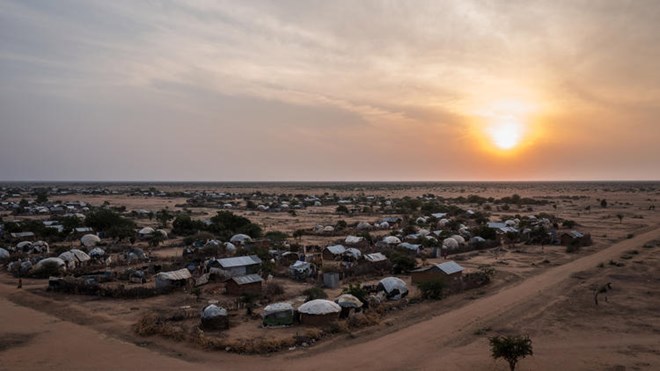
Nearly a quarter-million refugees, mainly Somalis, live in the Dadaab camp in Kenya. (Nichole Sobecki / Washington Post)
She looked down at the cracked screen of her white cellphone, where she had written notes reminding her what to tell the interviewers.
"This scholarship is my only way out," it said.
"I'm the best girl in the camp based on merit," it said.
"Here I cannot awaken my dreams," it said.
She took a deep breath.
A middle-aged woman stepped outside and called her name.
Ayan walked inside.
The afternoon before the interview, Ayan had pulled two lawn chairs into the sandy expanse in front of her hut. Her best friend, Maryan Hassan, sat across from her, with a list of mock interview questions ready.
"Describe yourself," said Maryan, 20, a tiny girl with a high-pitched voice who was also a finalist for the scholarship.
"I was born in a refugee camp in 1997," Ayan began, in the careful English she had studied in school. "My parents are in Somalia."
"Don't forget to tell them what you want to do for your country," Maryan interrupted.
Ayan nodded.
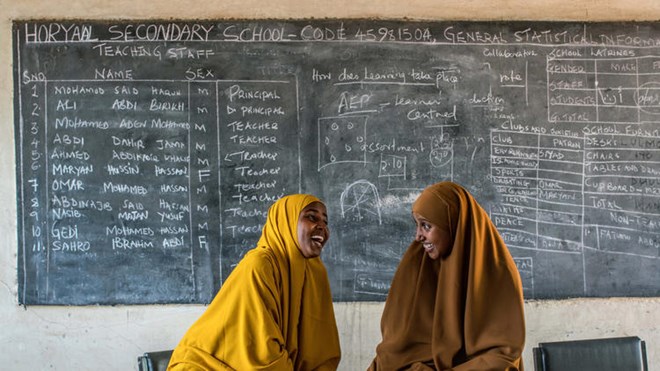
Ayan Abdi, right, meets Maryan Hassan to catch up after work at Horyaal Secondary School, where Maryan works as a teacher (Nichole Sobecki / Washington Post)
They were trying to figure out how to distinguish themselves from the other refugees. But on the Internet, all they could find were generic interview questions, so that's what they studied.
"What are your strengths?" Maryan asked.
"My ability to collaborate," Ayan answered, a little unsure of herself, trying to remember what she had read online. "What are yours?
"I don't give up," piped Maryan.
A cloud of flies hovered around their faces. The goats living nearby yapped. In both directions were rows of hundreds of huts made of whatever people could find - tin cans, tree branches, plastic sheets bleached by the sun. There were 250,000 refugees in all, surrounded by police checkpoints.
"If I get out of here," Ayan said under her breath, "I'm never coming back."
For years, Ayan and Maryan had watched their friends disappear, dropping out of school as they were forced to marry older men, in accordance with old Somali cultural traditions. Fatima left when Ayan was 11. Mahado when she was 13. Farhiya when she was 14. They would reemerge, sometimes years later, balancing babies in their arms, sullen and tired.
What was the point of school anyway, some of Ayan's friends scoffed. You could finish high school, but there was little work in the camp. And refugees were not allowed to hold jobs in Kenyan cities.
Ayan was 12 when she learned of the WUSC scholarship, advertised in fliers taped to the sheet-metal walls of classrooms. It turned her from a good student who loved adventure novels into someone whose grades were part of a grand strategy of escape.
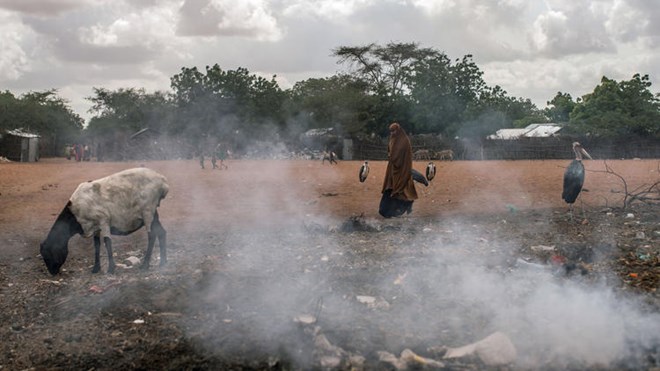 Ayan Abdi walks past piles of burning trash, surrounded by storks and goats scavenging for food. (Nichole Sobecki / Washington Post)
Ayan Abdi walks past piles of burning trash, surrounded by storks and goats scavenging for food. (Nichole Sobecki / Washington Post)
She and Maryan taught themselves to type at the camp in a market stall called Bukhara Computer School, with a row of old IBM desktops. In 2012, both girls received scholarships to attend top high schools hundreds of miles from the camp, with college-educated teachers and new textbooks. On their phones, they would enter in the search bar: "Best Universities in Canada."
In 2015, when Ayan was away at high school, her mother and two siblings left Dadaab and returned to Somalia. They were sick of life in the camp and worried about Kenya's threat to deport the refugees.
Come back to Somalia, her mom said by phone from a town outside Mogadishu, the capital.
Ayan knew what that meant. No schools. Few jobs. And a constant threat from al-Shabab, the Islamist extremists who controlled nearby villages.
In Dadaab, at least there was the WUSC.
I am going to disobey you for the first time, Ayan replied.
She graduated near the top of her class and then moved back to Dadaab, into a stick hut next to the home of family friends. She covered the dirt floor with a red bedsheet and surrounded the hovel with a pile of thorny branches, to keep out the men who knew she was unmarried and alone.
"The harsh realities of life here are traumatizing," she wrote in her personal essay for the WUSC scholarship. Women were raped when they went out to collect firewood for cooking. Children died of chronic diarrhea during cholera outbreaks. When she was filling her water bucket one morning, Ayan was stung by a scorpion.
Ayan and Maryan talked about their lives in Canada, how they would walk across green college campuses, how they would get their families to safety.
"When I see her," Ayan said, nodding toward her friend, "I see WUSC." Maryan smiled.
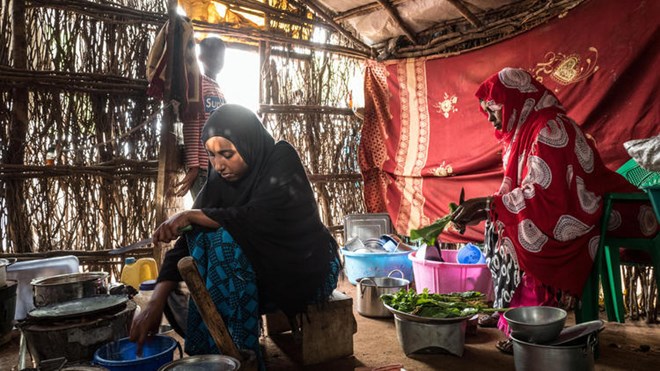
Ayan Abdi helps prepare breakfast for Shamis Mohamed and her family, who have given her a home since her family returned to Somalia. (Nichole Sobecki / Washington Post)
Around the world, fewer than 1 percent of registered refugees are resettled each year, and most have little or no control over the process. They are selected by U.N. agencies and approved by host governments, their fate determined by luck and charity, with the sickest and most vulnerable put at the front of the line.
The WUSC scholarship represented something different. It was about merit.
"Make sure you're smiling," Maryan had told Ayan as they prepared for their interviews.
Ayan was determined not to become emotional.
"It's not professional," she had said. "You need to show them that you're confident.”
Five minutes had passed since Ayan climbed the steps into the cinder-block building. Then 10.
Through the screened window, the other students waiting their turn outside could see her silhouette in front of the three interviewers.
It was the middle of the afternoon, the sun slicing through sparse trees.
"It's taking a long time," said Mohammed Abdi, one of the applicants, looking at the building.
Finally, Ayan emerged, glancing at the students waiting in a cluster of plastic chairs.
"I think I said the right things," she said. "I think."
But in the next hours and days, she would replay her performance in her head, over and over.
She had walked into the cinder-block room. The three women welcomed her. Ayan remembered to shake the interviewers' hands, even though she was so nervous she could hardly focus. One woman told her to relax, and that had helped. She sat at a wooden desk.
They asked her when she had arrived in the camp, what she remembered about the journey. Ayan told them that she had been born in another camp in Kenya but that her family had to leave after it was damaged by fire, and that was how they had wound up at Dadaab.
"I told them the name of the road we took. I told them I was just a baby."
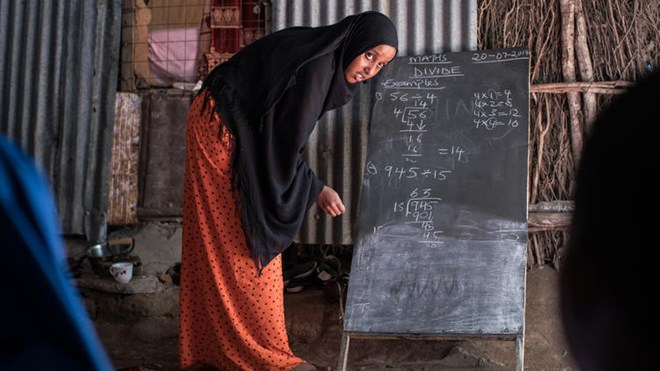
Ayan Abdi reviews multiplication and division with a neighbor's children, whom she tutors on breaks and in the evening. (Nichole Sobecki / Washington Post)
They asked about the importance of education.
"I told them it had shaped me emotionally."
Then one of the administrators asked about the challenges she had faced as a refugee. And suddenly, the weight of it all hit her.
"I told them: 'I'm here alone. My family has left. Without this scholarship, I have no other options.' "
And Ayan began to cry.
"I couldn't stop the tears."
The women waited.
"They handed me a tissue. I tried to get back under control."
The questions continued. They asked what she wanted to study, and she said nursing.
They asked how she would adjust to Canada.
"I told them I would wear more clothes in the winter. I told them I would get used to the food."
Ayan tried to hold back her tears. She didn't want to look desperate. Finally she managed to focus on the words she had prepared.
"I said, 'I am the best girl in the camp based on merit.’ "
The day after the interview, Ayan walked to Hagadera Secondary School in the camp, where she teaches biology, sending most of her $80 monthly salary to her mother.
In the classroom, there were 21 boys and two girls in their mid-teens sitting on opposite sides of the room. A bell rang and class began.
"What is the difference between a plant cell and an animal cell?" she asked.
No one answered.
Ayan tried her best to push her thoughts about the scholarship to the side. It was early June, and she would have to wait about a month for the results.
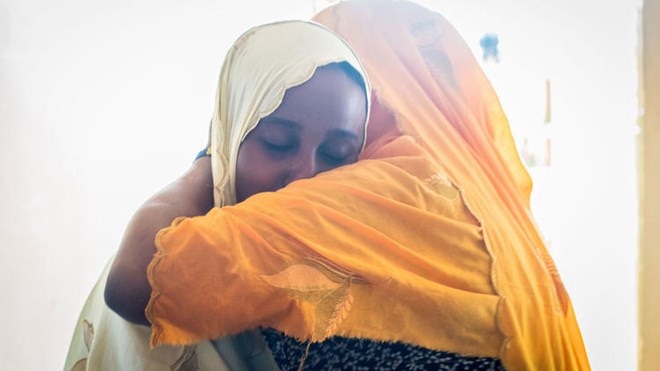
Ayan Abdi gets a hug from Farhiya Abdikadir, 18, a friend she is visiting in Nakuru, Kenya. (Nichole Sobecki / Washington Post)
"I'm 50-50," she said one day of her chances. But a few days later she had reassessed, thinking about the caliber of the other candidates.
"I'm 20-80."
She thought: "Maryan will get it, but I won't. I'm going to be stuck here forever."
She wrote a text message to a friend: "I'm not sure I convinced the interviewers."
The WUSC committee didn't say exactly when the announcement would come. She checked her phone obsessively.
It buzzed and buzzed, often with messages from Maryan, who lived in another part of the camp.
"We still have to wait," Maryan wrote in the middle of the month.
The school was a reminder of all the limitations of Dadaab. The boys often ignored commands from female teachers. Islamic clerics shut down the girls' debate team, saying it gave women the wrong idea.
More female students dropped out every week, disappearing into marriage, often by force. Ayan had tried to intervene with one of the girls' mothers, who responded with an old Somali proverb:
"A woman should be at home or in the grave."
In late June, the Muslim holy month of Ramadan began, with its long, hot days of fasting. Ayan was desperate to get away.
She walked to the police station and applied for a temporary pass to leave the camp. She explained that she wanted to visit the family that had hosted her while she attended the private high school in Nakuru, in western Kenya.
Ayan was given a white piece of paper that allowed her two weeks outside the camp.
"I feel free here," she said in the living room of the Abdirahman family's apartment, on the bottom floor of a concrete apartment building, with a lightbulb hanging from the ceiling and a gate that opened onto a paved road and passing cars.
She wore a pale yellow headscarf, shorter than the ones that women wore outside in Dadaab. She blared songs from her phone: Nigerian pop, American hip-hop, traditional Somali music.
It was easier to forget about the scholarship here, visiting her high school friends. But occasionally they would bring it up.
"We just hope you get it," Anisa Abdirahman, 21, said one morning.
"Dadaab is not a place for a person to live," said Anisa's 23-year-old brother, Mohammed.
Ayan was looking at her phone.
The scholarship finalists had created a group on the WhatsApp messaging service where they shared rumors, news - anything at all about the WUSC program. But it was silent.
"Still nothing," Ayan said the following morning, sitting on a couch in the living room.
She threw her phone down on the cushion and went to the kitchen to make tea.
She crushed cinnamon and leaves.
"All of us, we are qualified. All of us, we are refugees," she told Anisa as the water boiled. "Maybe it's just luck."
In the other room, her phone started buzzing, The screen flashed.
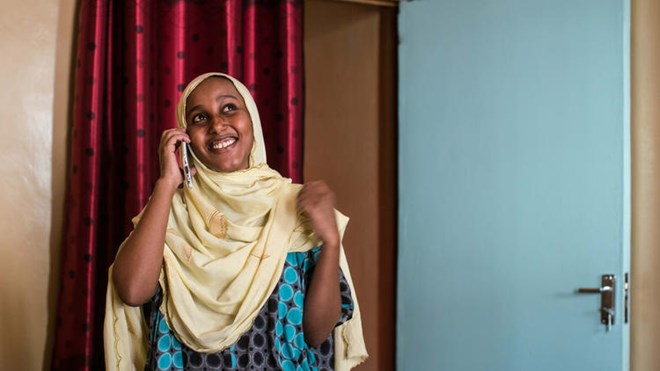
Ayan Abdi calls a friend at the Dadaab refugee camp who congratulates her on being accepted into the Canadian scholarship program. (Nichole Sobecki / Washington Post)
From the kitchen, Ayan couldn't see it.
"Ayan, I think your phone is ringing," Mohammed said.
Ayan cleaned her hands, picked up the phone and saw the message.
"Congrats."
Her eyes widened.
"WUSC? Is it a prank?"
Then she saw a list on the WhatsApp group: "The Successful Candidates for 2018 WUSC scholarships." Her name was No. 4.
She burst into tears.
"Thank God! Thank God!" she yelled.
Her friend Farhiya ran into the room. She grabbed Ayan's hands and they danced in circles, tears rolling off Ayan's cheeks.
"You can stop crying now," Farhiya said.
Ayan looked again at the list for Maryan's name. It wasn't there. "Oh," she groaned.
But her phone was ringing nonstop now. There were calls from other winners. Calls from her teachers. Calls from numbers she didn't recognize.
"Alhamdulillah," she told one friend. Praise be to God.
"It is the beginning of a new life," she told another.
Then Maryan's number popped up on the screen.
"Congratulations," said the voice on the other end of the line. It sounded as if she had been crying.
"Maryan, I'm very sorry," Ayan said.
They would have another year together. Ayan would be applying to universities in Canada, practicing her English and getting an introduction to Canadian culture. Maryan would have one more chance to apply for the scholarship - albeit with poor odds after being rejected already.
"Goodbye, sister," Maryan said.
Ayan lowered the white phone from her ear and stared at it. More congratulatory texts were popping up. But Maryan had hung up and was gone.